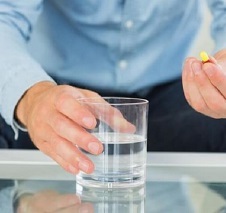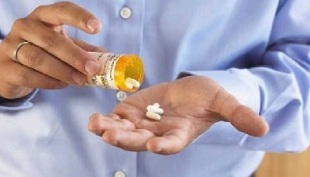
Antibiotics for chronic prostatitis are prescribed to remove the bacterial factor that causes inflammation of the gland.
The goals of antibiotic therapy are to alleviate symptoms, prevent complications, and restore normal prostate function.
Remedies are prescribed by a doctor based on test results. The general name "antibiotics" means several groups of drugs of different composition with pronounced antibacterial activity.
True antibiotics are substances of natural (natural) origin or their full synthetic analogues.
Classification of chronic prostatitis
There are three main forms of chronic prostatitis:
- Chronic bacterial prostatitisis a prostate lesion associated with the development of pathogenic microflora. It passes with symptoms similar to those of acute prostatitis (pain during urination, the presence of pus and blood in the urine, and so on), but there are more blurred (relieved) manifestations.
- Chronic nonbacterial prostatitisis a type of damage to the male prostate, caused by causes other than pathogenic bacteria (for example, trauma or the formation of stones in the prostate), detected in the presence of infectious diseases. However, the name of the pathology refers only to the etiology of the disease, and not to its course, since in the process of pathogenesis the development of pathogenic microflora identical to other types of prostatitis is recorded.
- Chronic asymptomatic prostatitisis a pathology of the prostate, caused by the presence of pathogenic microflora in the prostate area and is asymptomatic or almost asymptomatic. Bitan! If this type of disease is suspected, as a rule, it is detected during the diagnosis based on the presence of such pathological phenomena as leukocyturia and / or bacteriuria, an additional diagnosis is needed. This is due to the similarity of the course of chronic asymptomatic prostatitis with prostate cancer.
What antibiotics are there?
In recent years, bacterial resistance to certain drugs has increased sharply, so before starting antibiotic treatment of prostatitis in men, it is necessary to examine the patient for the entire STI group, and for pathogenic flora to determine the resistance of certain microorganisms to certain drugs.
What antibiotics are used to treat prostatitis at home? There are the following groups of antibacterial drugs (the best antibiotics for prostatitis in men):
- Penicillins.In the past, such antibiotics were actively used for inflammation of the prostate, with the advent of the most active antibacterial drugs, they have practically lost their clinical significance, due to the increased number of negative bacteria resistant to penicillins.
- Macrolides.These antibiotics for prostatitis have a broad spectrum of action and low toxicity.
- Tetracyclines.They have activity against gonococci, chlamydia, mycoplasma. It is more commonly used in the treatment of chronic infectious prostatitis caused by the above pathogens.
- Fluoroquinolones.It is often used for the complex treatment of chronic inflammation of the prostate and acute uncomplicated inflammation of the prostate (efficiency up to 100%). They have high activity and low toxicity (do not disturb the intestinal microflora).
- Cephalosporins.It is actively used in the treatment of acute forms of bacterial prostatitis. These are good antibiotics for prostatitis, have a broad spectrum of action and high activity against pathogenic bacteria.

At the same time, modern medicine uses antibiotics for prostatitis or other diseases because of its capabilities:
- quickly destroy the source of the disease and eliminate inflammation;
- produce substances that kill or stop the growth of bacteria and large viruses, but are safe for the cells of the macroorganism;
- act when administered externally (suppositories, ointments) and other routes of administration: intramuscularly, orally, intravenously;
- fight many pathogens (broad-spectrum antibiotics) at the same time.
What are the most effective antibiotics
To cure or reduce the manifestations of infectious prostatitis, strictly follow the doctor's recommendations. Start the course only after the diagnosis, when the doctor understands the nature of the disease. Self-treatment at home is fraught with devastating consequences, malfunctioning bodily systems.
Recommendations for antibiotic therapy
Antibiotic side effects can be just as problematic as worsening prostatitis.
Typical disadvantages of each group of drugs:
- Penicillins: rash, dermatitis, diarrhea;
- Cephalosporins: diarrhea. Rash and fever are rare;
- Macrolides: nausea, vomiting. Occasionally there is colitis, cholestatic jaundice;
- Fluoroquinolones: abdominal pain, diarrhea.
Diarrhea is the most common side effect of antibiotics. It is caused by two reasons: an imbalance of the intestinal microflora, an overgrowth of bacteria called Clostridium difficile. Diarrhea can be prevented and eliminated by taking pro- and prebiotics in parallel.
Antibacterial therapy
In addition to antibiotics, the following treatments are used to successfully treat prostatitis, especially chronic:
- prostate massage is the best way to improve the blood supply and discharge of inflammatory secretions from the prostate;
- physiotherapy;
- non-steroidal anti-inflammatory drugs - not used in parallel with fluoroquinolones;
- herbal preparations;
- alpha blockers.
In order to effectively cure the disease, it is necessary to conduct a diagnosis that will show the type of bacteria that cause the disease in a particular patient, their sensitivity to drugs. Based on the test results, the doctor decides which means to treat chronic prostatitis or an acute form of the disease.
























